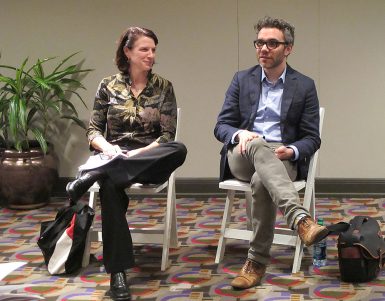NYT’s Nick Bilton shares insight on media, new technology

Nick Bilton, a New York Times technology columnist, says journalism and media have reached a golden age.
“As journalists, other smaller entities come after us and try to do what we do, “ he told an audience in the IU auditorium Tuesday. “ We have to do what we do better. We have to break better stories and write better stories, which drives viewers to our site.”
Bilton was on campus as the keynote speaker for IU’s Statewide IT conference. His talk was co-sponsored by The Media School.
After informing the large crowd about technology to keep an eye out for – from ingestible computers to online currency – Bilton participated in an onstage Q and A with Brad Wheeler, IU vice president for information technology.
“For our Media School students, if they say they want to be a Nick Bilton, what should they do during their college years?” Wheeler asked.
“Become incredibly proficient on social media and other forms of media,” Bilton quickly replied. “I don’t just write a column and go sit on the beach. I send it to my editor, then I tweet it, share it on Facebook. There’s a whole process.”
Media School students had a chance to ask Bilton their own questions during an informal session afterwards.
Journalism lecturer Bonnie Layton introduced Bilton, recounting his foray into technology reporting as a contributor to the NYT column Bits. She also said he is credited with convincing the FFA to allow cellphones on planes by disproving FFA claims in a series of articles.
Layton began the session by asking about delivery of media using different devices.
“We’re seeing growth in cyber journalism and sensor-based journalism,” Bilton said, giving an example of NYT foreign correspondents in war zones. “They hear an explosion and run up to the roof to see where the smoke is coming from because that’s how it has always been done. One of concepts we’ve explored was placing audio-based sensors around the area, consistently gathering data.
Journalism graduate student A.Jay Wagner continued the conversation.
“How far do we go with technology?” he asked.
“That’s a question that no one knows that answer to,” Bilton replied. “One thing I do know is that it’s not stopping. It’s technology that is moving forward and it’s moving at the pace it’s moving. You can embrace it and put your mark it on it, but that’s all you can do.”
Bilton also explained his take on technology and privacy.
“People just don’t care anymore,” he said about privacy. “I used to write privacy stories about Facebook doing XYZ, and they’d get thousands and thousands of page views. Now, it’s next to nothing.”
But, he added, new technology will bring new issues. Hacking is also a noteworthy problem, he said.
“I have webcams in my home to see if my dogs are chewing up things when I’m out,” he said. “When I’m home, I unplug them because I don’t trust them.”
Visiting lecturer Erika Biga Lee asked what Media School students need to know about technology before they graduate.
Bilton responded with two main lessons everyone should learn.

“No one should be able to write about anyone else until they themselves have been written about negatively,” he said. “One of the things about technology is that it’s easy to write anything without repercussions.” He warned that writing whatever about whomever could have negative implications.
“Those technologies are also incredibly powerful for good,” he added. “They can be used to share your stories, to talk to sources, to do all of these things. You have to be proficient in all those things. It’s like another language.”
He shared an example of using innovation to improve his journalism. While researching his latest book, Hatching Twitter, Bilton recreated scenes he never saw.
“The thing that was fascinating to me was the amount of reporting I was able to do through social media,” he said, explaining that he was able to find details such as the shape of a room and the color of a person’s hair.
Ryan Myers, a senior in communication and culture senior, questioned how the success of a story is measured when metrics are available. “What happens when your articles are paid via the number of clicks?“ he asked.
“Success is about impact, not page views,” Bilton replied. He told the story of a column he wrote a few weeks ago that was rapidly and widely shared through Facebook.
“It’s a crowning achievement because it got so much attention,” he said “But its not affecting global change.”

